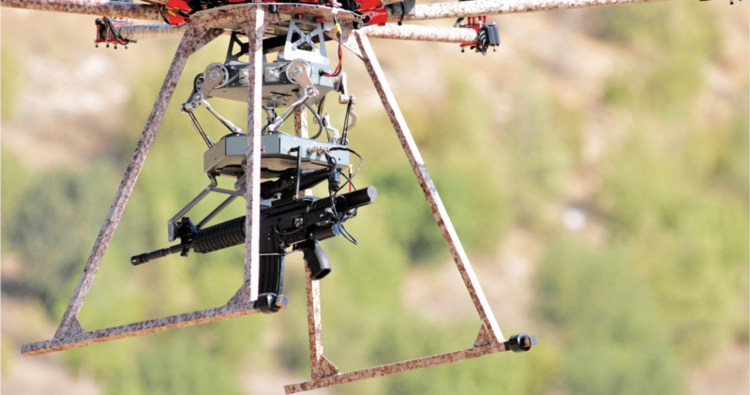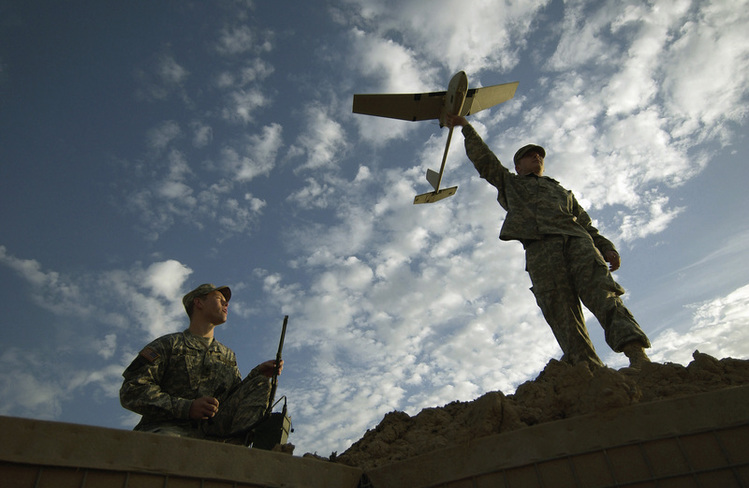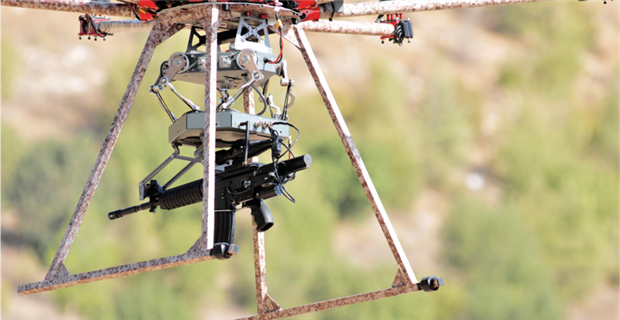Brewing controversies over “killer drones” are not deterring companies from designing and offering new types of unmanned weapons for which they see a demand in the market.

The United States’ best-known unmanned weapons are remotely piloted aircraft like the Predator. The military has deployed hundreds of these systems in the U.S. war against jihadists. And the Pentagon intends to continue to invest in even more advanced unmanned aircraft for strike and surveillance missions.
Drone manufacturers also see a wave of innovation in small, soldier-operated armed drones that would serve as aerial spies and snipers for ground forces.
“It is heartbreaking to see how many soldiers are killed in war zones like Afghanistan because they can’t get fire support quickly enough to fight back,” says Raziel “Razi” Atuar, the CEO of startup Duke Robotics.
This story was originally published by Real Clear Defense
Atuar, a veteran of the Israeli military, helped design a gun-carrying drone that he nicknamed “the future soldier.” He argues that remotely operated small drones could help reduce casualties in future conflicts.

Known as Tikad, Duke Robotics’ armed drone earned the prestigious Security Innovation Award in 2016 from the U.S. Department of Defense Combating Terrorism Technical Support Office.
Drones have gotten a bad name because of the ethical implications of “remote killing.” But the flip side of that equation is that U.S. troops get taken down by snipers and suicide bombers, and gun-firing drones could help protect them, Atuar tells RealClearDefense.
The 110-pound Tikad he developed with a team of combat veterans can be equipped with cameras for targeting, and can carry rifles, machine guns and grenade launchers.
Duke Robotics, based in Gulf Breeze, Fla., is looking to recast the debate over drone warfare and is marketing the Tikad as an alternative to boots on the ground. The company is seeking to raise up to $15 million from the sale of common stock and is offering shares to the public under the marketing campaign “Invest in Keeping Our Troops Safe.” Anyone can purchase stock for as little as $450.
Crowdfunding investments are unusual in the defense industry but Atuar says the response has been favorable. The American public over the years has questioned the high level of combat casualties in the U.S. war on terrorism, he says. U.S. forces tend to find themselves at a disadvantage in an “asymmetric battlefield” where enemies are disguised and perpetrate surprise attacks. “You don’t see any more armies against armies,” says Atuar. “You see insurgents blended in with civilian areas.” By reducing the need for ground troops, he adds, there is less likelihood of military and civilian casualties.
In the type of guerilla warfare that U.S. ground troops have been fighting against, there is little time to react, and calling in artillery or airstrikes can take too long to make a difference, he says. In close-up engagements and raids, soldiers in small teams could rely on a drone for fire support when they are in danger. “Airstrikes within seconds only happen in movies,” says Atuar.
The idea of providing “air support on demand is game changing,” he says, insisting that it empowers troops in ways that have not been possible thus far. “As a former special mission unit commander, I see a need for this.
Israel’s Ministry of Defense recently included the Tikad in a list of “weapons of the future” that should be of interest to the country’s defense forces
The debate over killing machines, Atuar says, does not mean technology development should have to slow down. Wars are not going away, he points out, and soldiers need new capabilities to fight furtive enemies.

The U.S. Army for years has experimented with several types of flying snipers but nothing as small as the Tikad. Atuar is pitching the system to the Army, Marine Corps and U.S. Special Operations Command.
The drone industry, meanwhile, is finding itself in the middle of a growing controversy after a group of 116 artificial intelligence experts, in an open letter last month to the U.N. Convention on Certain Conventional Weapons, sounded alarms that “lethal autonomous weapons threaten to become the third revolution in warfare.”
At this week’s Defense and Security Equipment International arms show in London, British military officials declared that drones and other remotely operated weaponry will always be under human control.
“It’s absolutely right that our weapons are operated by real people capable of making incredibly important decisions, and we are guaranteeing that vital oversight,” U.K. Ministry of Defence official Mark Lancaster told The Guardian.
The move by the MoD to clarify its unmanned weapons doctrine was not surprising in the wake of the global campaign by robotics experts to call attention to the dangers of artificial intelligence when applied to weapons. According to The Guardian, other NATO countries are expected to make similar commitments to ensure armed drones are monitored by trained controllers.


